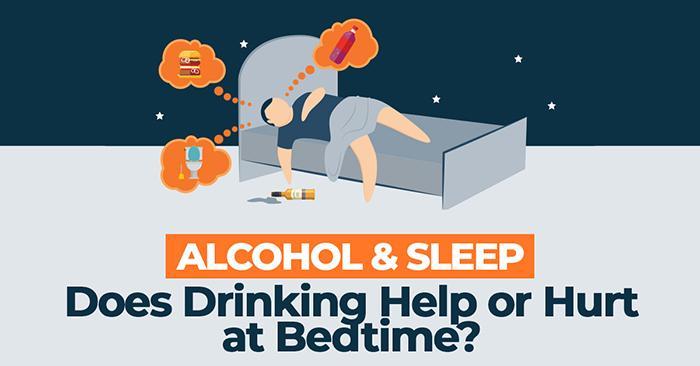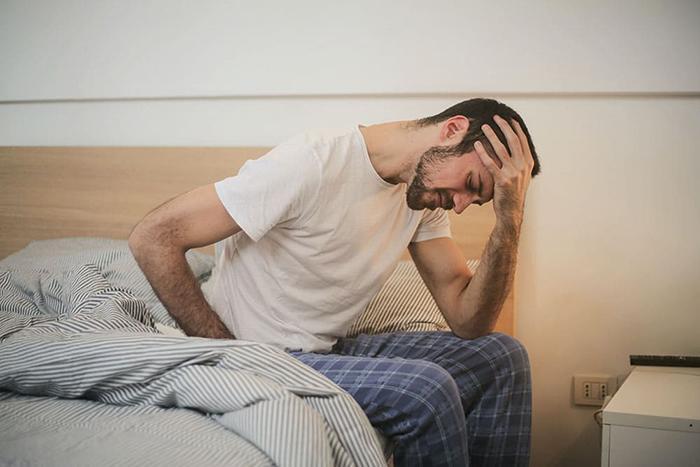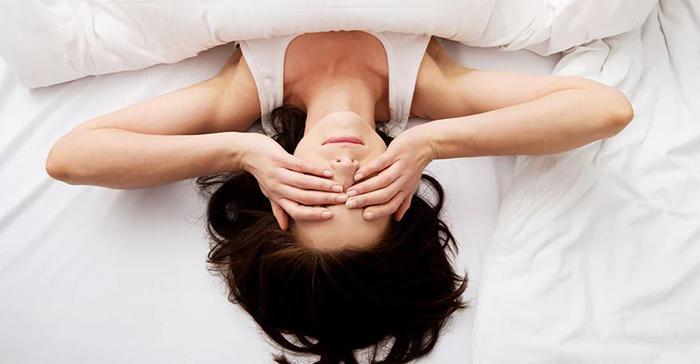Ever wondered why you feel so tired the day after drinking alcohol? It’s a common question that puzzles many of us.
This article unravels the science behind this fatigue, revealing how alcohol disrupts your sleep and drains your energy levels.
You Are Watching: Why Does Alcohol Make Me Tired The Next Day Updated 11/2025
Keep reading to discover more about this post-party phenomenon and tips on how to reduce these effects!
How Alcohol Disrupts Sleep

Alcohol disrupts sleep by preventing REM sleep, interrupting circadian rhythm, stripping the body of vital nutrients, causing frequent urination, and impairing blood sugar control.
Prevents REM sleep
Alcohol has a deceptive relationship with sleep. At first sip, it may induce soothing drowsiness, lulling you into believing it’s a sleep aid. However, this is far from the true nature of alcohol’s effects on our sleeping patterns.
Research indicates that while alcohol might help us fall asleep quicker due to its sedative properties, it causes a significant reduction in rapid eye movement (REM) sleep. This deep stage of sleep is essential for cognitive functions like learning and memory consolidation; it’s when most dreaming occurs as well.
Unfortunately, consuming alcohol before bedtime disrupts this crucial phase of restful slumber.
Instead of waking up refreshed and revitalized after REM-rich sleep, you’re more likely to wake up feeling wearied and groggy – all thanks to your alcoholic beverage messing with your REM cycle.
Interrupts circadian rhythm
Alcohol can wreak havoc on our circadian rhythm, the internal clock that regulates our sleep-wake cycles. When we consume alcohol, it disrupts this delicate balance and throws off our body’s natural sleep patterns.
Research has shown that alcohol consumption before bed can decrease the amount of time spent in rapid eye movement (REM) sleep, which is essential for restorative rest. Additionally, alcohol interferes with the release of melatonin, the hormone responsible for signaling to our bodies that it’s time to sleep.
As a result, even if we manage to fall asleep after drinking, the quality of our slumber is significantly compromised.
Our circadian rhythm relies on consistency and routine to function optimally. Alcohol disrupts this by causing fragmented and incomplete sleep cycles throughout the night.
This means that even if we get a reasonable number of hours in bed after consuming alcohol, we may still wake up feeling tired and groggy because we haven’t had enough deep or restful sleep.
Strips body of vital nutrients
Alcohol not only affects sleep, but it also strips the body of vital nutrients. When we consume alcohol, our bodies metabolize it into acetaldehyde, which is a toxic substance that needs to be quickly eliminated.
To do this, the body requires certain vitamins and minerals like B vitamins and magnesium. However, excessive alcohol consumption can deplete these essential nutrients from our system, leading to fatigue the next day.
Furthermore, alcohol interferes with nutrient absorption in the gut, making it even more difficult for our bodies to obtain the necessary fuel for energy production.
So while a night of drinking may temporarily make us feel relaxed or sleepy due to its sedative effects, it can ultimately leave us feeling exhausted as our bodies struggle to recover from the depletion caused by alcohol consumption.
Frequent urination
Alcohol can have a significant impact on our urinary system, resulting in frequent trips to the bathroom. When we consume alcohol, it acts as a diuretic, meaning that it increases urine production and causes dehydration.
This can lead to more frequent urination throughout the night and even into the next day. Dehydration not only affects our body’s ability to function optimally but also disrupts sleep patterns, making us feel tired and fatigued.
So if you find yourself constantly needing to use the restroom after a night of drinking, it’s because alcohol is causing your body to lose more fluids than usual through increased urine output.
Impaired blood sugar
Drinking alcohol can lead to impaired blood sugar levels, which can contribute to feelings of fatigue the next day. When you consume alcohol, your body’s ability to regulate glucose is disrupted, causing a drop in blood sugar levels.
This decrease in blood sugar can leave you feeling tired and sluggish as your body struggles to maintain its energy levels.
Additionally, alcohol metabolism prioritizes breaking down the toxins from alcohol rather than maintaining stable blood sugar levels.
Read More : Can You Drink After Giving Birth Updated 11/2025
This imbalance can further exacerbate feelings of fatigue post-alcohol consumption.
It’s important to note that excessive and prolonged alcohol use can have more severe effects on blood sugar regulation and may increase the risk of developing conditions like diabetes or hypoglycemia.
The Connection Between Alcohol and Fatigue

Alcohol causes fatigue by exerting sedative effects on the body and triggering physical responses that contribute to tiredness.
Sedative effects of drinking
Alcohol has sedative effects on the body, which means it can make you feel more relaxed and sleepy. This is because alcohol enhances the function of gamma-aminobutyric acid (GABA), a neurotransmitter that inhibits brain activity.
As a result, your brain’s neuronal firings slow down, leading to feelings of sleepiness and fatigue. While this may help with falling asleep initially, drinking before bed can actually disrupt the quality of your sleep throughout the night.
So while alcohol might make you feel drowsy in the moment, it can actually contribute to feeling tired and groggy the next day.
Physical responses in the body
Alcohol affects the body in various ways, leading to physical responses that can contribute to fatigue the next day. When consumed, alcohol acts as a sedative, slowing down brain activity and inducing relaxation.
This sedative effect is due to alcohol’s enhancement of gamma-aminobutyric acid (GABA), which inhibits neuronal firings and promotes sleepiness.
Additionally, drinking alcohol can disrupt the balance of neurotransmitters in the brain, including serotonin, which plays a crucial role in regulating mood and energy levels.
Low serotonin levels can lead to decreased energy production and feelings of fatigue. Moreover, consuming alcohol before bed may have immediate effects on sleep quality throughout the night.
While it may help with falling asleep initially, it ultimately disrupts REM sleep – the deepest stage of sleep where dreaming occurs – leading to poor overall rest and leaving you feeling tired the following day.
How Alcohol Affects Energy Levels

Alcohol lowers serotonin levels, disrupts sleep quality, and decreases energy production.
Lowers serotonin levels
Alcohol consumption has been linked to lowered serotonin levels, which can contribute to feelings of fatigue the next day. Serotonin is a neurotransmitter that plays a crucial role in regulating mood, sleep, and appetite.
When alcohol enters your system, it affects the balance and production of serotonin in the brain. This can lead to decreased energy levels and a general sense of tiredness. Additionally, alcohol also disrupts your sleep patterns by reducing rapid eye movement (REM) sleep, which is essential for restorative rest.
So while you may feel sedated initially after drinking, the overall quality of your sleep suffers, leaving you feeling fatigued when you wake up.
Poor sleep quality
Alcohol consumption can seriously impact the quality of your sleep, leaving you feeling tired and groggy the next day. When you drink alcohol, it interferes with your sleep cycle by reducing rapid eye movement (REM) sleep, which is crucial for restorative rest.
REM sleep is when dreaming occurs and plays a vital role in memory consolidation and overall cognitive function. So, even if you manage to fall asleep after drinking, you may not be getting the deep and restful sleep that your body needs.
Not only does alcohol disrupt REM sleep, but it also causes frequent awakenings throughout the night. This can lead to fragmented sleep patterns and leave you feeling fatigued during the day.
While alcohol may initially make you feel drowsy or help you fall asleep faster due to its sedative effects on the central nervous system, it ultimately disrupts the natural rhythm of your sleep cycle and impairs overall sleep quality.
Decreased energy production
Alcohol consumption can lead to decreased energy production in the body. When we consume alcohol, it affects our serotonin levels, which play a vital role in regulating mood and energy. Lower serotonin levels can result in lower energy levels and feelings of fatigue.
Additionally, alcohol disrupts the quality of sleep by interfering with REM sleep, the deep stage of sleep responsible for rejuvenation and restoration. Poor sleep quality further contributes to lethargy and reduced energy output.
So, while alcohol may initially make you feel relaxed and sleepy, it ultimately hampers your body’s ability to produce adequate amounts of energy the next day.
Tips for Reducing Alcohol-Related Fatigue

Moderating alcohol consumption
To reduce alcohol-related fatigue, one important step is to moderate your alcohol consumption. This means drinking in moderation and being mindful of the amount you consume. Excessive alcohol intake can disrupt your sleep patterns, dehydrate your body, and cause other negative effects that contribute to tiredness the next day.
By keeping track of how much you drink and setting limits for yourself, you can minimize these issues and improve your overall energy levels. Additionally, it’s essential to be aware of any underlying alcoholism issues that may require professional help or support groups.
Taking responsibility for your drinking habits can go a long way in preventing post-alcohol fatigue and promoting better physical well-being.
Getting enough sleep
To combat alcohol-related fatigue, getting enough sleep is crucial. When we sleep, our bodies have the opportunity to rest and recover from the effects of alcohol. Adequate sleep allows our brains to recharge and restore normal function, helping to alleviate feelings of drowsiness and lethargy the next day.
It’s important to prioritize a good night’s rest after consuming alcohol as it can improve overall energy levels and help regulate mood. Lack of sleep can exacerbate hangover symptoms, leading to decreased alertness and productivity throughout the day.
By making sure you get sufficient sleep, you give your body the chance it needs to fully recover from alcohol-induced fatigue.
Hydrating properly
Proper hydration is crucial when it comes to reducing alcohol-related fatigue. Alcohol is a diuretic, which means it causes increased urination and can lead to dehydration.
Dehydration not only leaves you feeling sluggish but also contributes to headaches and interferes with sleep, making you even more tired the next day.
To combat this, make sure to drink plenty of water before, during, and after consuming alcohol. Staying hydrated will help replenish lost fluids and mitigate the negative effects of alcohol on your energy levels.
Eating a balanced diet
Maintaining a balanced diet is crucial for combating alcohol-related fatigue. When we drink, our bodies are stripped of essential nutrients, so it’s important to replenish them through proper nutrition.
A nutrient-rich diet can help support energy levels and aid in recovery after drinking. Make sure to incorporate whole grains, lean proteins, fruits, and vegetables into your meals to provide the vitamins and minerals your body needs.
Additionally, staying hydrated by drinking plenty of water will help combat dehydration caused by alcohol consumption.
By fueling your body with the right foods, you can give yourself the best chance at avoiding that dreaded post-alcohol fatigue.
Engaging in physical activity
Regular physical activity can help combat alcohol-related fatigue and improve overall energy levels. Exercise has been shown to increase blood flow and oxygen delivery, which can enhance alertness and reduce feelings of tiredness.
Additionally, engaging in physical activity releases endorphins, the body’s natural feel-good chemicals, which can boost mood and counteract any low serotonin levels caused by alcohol consumption.
Exercise also promotes better sleep quality by helping regulate circadian rhythms and promoting deeper, more restorative sleep.
So whether it’s a brisk walk, a yoga class, or hitting the gym, finding ways to incorporate physical activity into your routine can go a long way in combating post-alcohol fatigue.
Seeking professional help if needed
If you or someone you know is struggling with alcoholism and experiencing excessive fatigue or tiredness after drinking, it may be time to seek professional help. Alcoholism is a serious condition that requires proper treatment and support.
Many treatment options are available, including therapy, counseling, support groups, and medication assistance. Professional help can provide the necessary guidance and tools to address alcohol addiction, promote sobriety, and improve overall well-being.
Remember that reaching out for assistance shows strength and determination in taking control of your health and happiness.
Conclusion
In conclusion, the tiredness we feel the day after drinking alcohol is due to a combination of factors. Alcohol disrupts our sleep by preventing REM sleep and interrupting our circadian rhythm.
It also strips our body of vital nutrients and causes frequent urination, leading to dehydration and fatigue. Additionally, alcohol lowers serotonin levels and decreases energy production in the body.
To reduce alcohol-related fatigue, it’s important to moderate alcohol consumption, get enough sleep, stay hydrated, eat a balanced diet, engage in physical activity, and seek professional help if needed.
Sources: https://chesbrewco.com
Category: Drink










